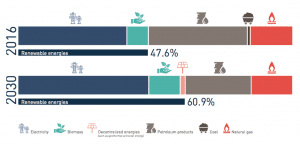On April 7th, the Quebec government released its Energy Policy 2030. The headlines are encouraging:
– Elimination of the use of thermal coal and the reduction of petroleum product use by 40%;
– A 15% increase in the energy efficiency of the economy, noting that in 2030, Quebec is expected to use the same total amount of energy as 2015, but be more productive; and
– Availability of 25% more renewable energy, including doubling the use of biomass as a source of energy.
Note : the targets use 2013 as the baseline year

With the subsequent announcement of a light rail transport system for greater Montreal by the Caisse de dépots, and encouraging federal action on green infrastructure funding, the transition to the low-carbon economy appears to be well and truly underway. EEM looks forward to seeing the first of the three 5‑year action plans due to be tabled before the summer and changes to regulation that the policy will likely induce. According to the policy document:
“Energy efficiency, energy substitution and behavioural change are the three linchpins of a successful energy transition. The linchpins are present, for example, when a public transit company decides simultaneously to enhance its services to reach a new clientele, replace its diesel vehicles with electric buses and support the continuous improvement of the energy performance of its new vehicles in order to consume less electricity.”
The Energy Policy 2030 claims to be able to achieve a greenhouse gas reduction for Québec of 18% relative to 1990. With 8.5% already in hand, that gives a 26.5% reduction. In order to achieve Quebec’s overall objective of a 37.5% reduction by 2030, a challenging further 10% will have to come from non-energy greenhouse gas reductions. Then there’s the further challenge of its long-term target consistent with IPCC recommendations at COP21: 80% to 95% by 2050. For some more background, clients are invited to read EEM’s issue brief on the Transition to the Low-Carbon Economy published last January and to contact us to discuss how corporate social responsibility action could help companies operate under this new reality.
Interesting for business, the policy announces a one-stop government shop for managing the transition to the low-carbon economy (Transition énergétique Québec), including the allocation of the funds collected from Quebec’s carbon trading program (les Fonds verts) that went into effect at the start of 2015. We can expect to see more opportunities for business to apply for financial assistance for both greenhouse gas reduction and energy efficiency innovations for those stretch projects.